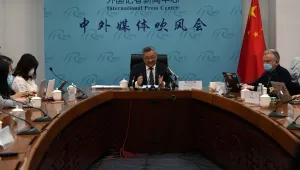THE PAPERS ARE full of the slow demise of Afghanistan. The Pakistanis are to blame; no, the Afghans; no, the United States. America didn't do enough or did too much. NATO isn't stepping up to the plate, or is it the Germans, or the French people. Is it the Taliban, Al Qaeda , or Pakistan's Inter-Service Intelligence that is pulling the strings? Is President Karzai powerless, or is he boosting the warlords, or is he a puppet for Americans , or all three? The blame is widespread.
But a large part of the problem is being missed. There's talk about the U S -Pakistan-Afghanistan tripartite, but it's the wrong one. The focus should be on the Afghanistan-Pakistan-India triangle.
In the 1980 s and early 1990 s, Afghanistan was a proxy battleground for the Cold War between the United States and the Soviet Union. One could argue that America was the winner in that battle (the Soviet Union and Afghanistan certainly weren't), except that US actions then created the threat from the Taliban today. There were no winners.
America and the Soviet Union brought two other neighbors into that Cold War fight: Pakistan and India. India stood by the Soviet Union as it quietly did in many other areas. Pakistan and its intelligence service became the middleman between the United States and the mujahedeen (later to form the Taliban).
When Soviet forces pulled out in 1989, Pakistan continued to support the rebels; India supported the forces that years later became the North Alliance. Now, 15 years later, the battle over influence in Afghanistan has not stopped. India is working on hearts and minds, opening consulates and providing over $750 million in infrastructure and training support, while Pakistan is trying to bridge the hostility existing since the Afghan and Pakistan governments ended up on different sides. And so the proxy war continues with a different cast.
There is more to this unacknowledged war than merely emotion and history. As long as India and Pakistan remain hostile to each other , Afghanistan is strategically important to both. It is vital to Pakistan that it not have unfriendly powers on both its east (India) and west (Afghanistan) borders, just as from India's perspective, Afghanistan would provide a good strategic high-ground to squeeze Pakistan. Economically, too, Afghanistan holds great promise. The United States last year tied Afghanistan and Pakistan together through the creation of Reconstruction Opportunity Zones along their mutual border which would get American tax exemptions. Afghanistan also is the l inch pin of the trade routes and energy pipelines to Central Asia. So, if the United States is going to reverse this sad decline in Afghanistan, it will need the support of both India and Pakistan. These two great nations should learn from past mistakes -- fighting over Afghanistan is not the solution. The costs are too great for all parties. The United States and Afghanistan need to find ways to invest both nations in helping to make this country a success; they clearly need all the help they can get.
This is going to require a fundamental change in attitudes in both the Indian and Pakistani governments. But there are some concrete efforts that could start the process.
First and foremost, a quadrilateral group composed of India, Pakistan, the United States, and Afghanistan should be created (in addition to the ongoing tripartite group that excludes India). This would put both India and Pakistan in a position where they would need to engage together on solutions to Afghanistan's problems.
Second, Pakistan should start to allow Indian goods to travel over land through Pakistan to Afghanistan, significantly reducing the costs of much of the assistance that India currently provides. Third, the four countries should put more effort into renewing the long-discussed pipeline through the three nations, providing much needed energy to the region and an alternative to the Iranian pipeline. Eventually, India, Pakistan, and the United States shouldconsider a joint Provisional Reconstruction Team in the northwest of Afghanistan, away from the Pakistan border. All these efforts are going to be hard and long in coming. But, unless a way to mitigate the underlying Pakistan-India tension in Afghanistan is found, this country will continue to be a battleground for this largely unspoken war. What's more, the benefits of building cooperation and trust in Afghanistan will help address the wider India-Pakistan conflict and enhance security across the region.
XeniaDormandy is executive director for research at the Belfer Center at Harvard's Kennedy School of Government. She was previously director for South Asia at the National Security Council.
Dormandy, Xenia. “Afghanistan's Proxy War.” The Boston Globe, February 16, 2007



